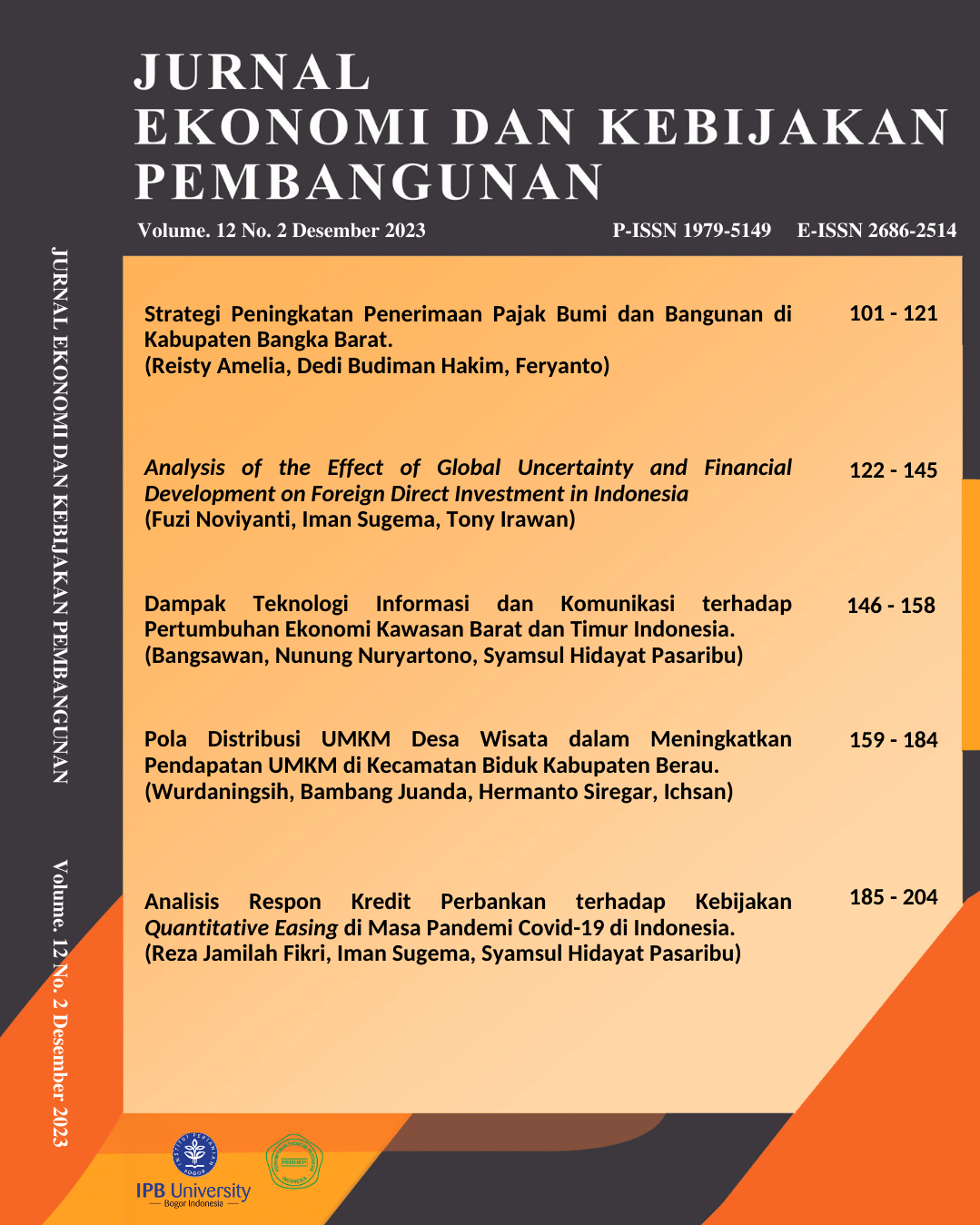Impact of Information and Communication Technology on Economic Growth in Western and Eastern Region of Indonesia Statistic Indonesian, IPB Univeristy
Abstract
The three main components of economic growth are capital accumulation, population growth, and technological progress. One form of technology that is experiencing rapid development at the global and national levels is information and communication technology (ICT). ICT plays an important role in supporting the activities of actors in increasing output in the form of goods and services. This research aims to analyze the impact of ICT on economic growth in the western region of Indonesia (KBI) and the eastern region of Indonesia (KTI) using descriptive analysis and the Generalized Method of Moment (GMM) model during the 2016-2020 period. The research results show that the ICT variables for landline telephones, cellular telephones and government ICT spending have a significant effect in driving economic growth in the eastern region, while for the western region the ICT variables do not have a significant influence on economic growth. The western region has not been able to make maximum use of the implementation of cellular telephone technology or ICT spending in improving the economy. To obtain the benefits of ICT as an economic driver in each region, the role of policy makers is needed in encouraging ICT adoption in the productive sector and providing access and technological infrastructure that can reach all regions and all levels of society.
References
Albiman MM, Sulong Z. 2016. The role of ICT in the economic growth of the Sub-Saharan African region (SSA). Journal of Science and Technology Policy Management. 7(3):306-329. doi: 10.1108/JSTPM-06-2016-0010.
[APJII] Asosiasi Penyelenggara Jasa Internet Indonesia. 2022. Profil Internet Indonesia 2022. Jakarta: APJII.
Arellano M, Bond S. 1991. Some tests of specification for panel data: Monte Carlo evidence with an application for employment equation. The Review of Economic Studies. 58(2):277-297. doi:10.2307/2297968
Arellano M, Bover O. 1995. Another look at the instrumental variable's estimation of error-components models. Journal of Econometrics. 68: 29-51. doi: 10.1016/0304-4076(94)01642-D.
Ariansyah K. 2018. Pengaruh Difusi Layanan Telekomunikasi terhadap Pertumbuhan Ekonomi Negara-Negara ASEAN pada Periode 2005-2016. Buletin Pos Dan Telekomunikasi. 16(1): 1-16. doi: 10.17933/bpostel. 2018.160101
Bahrini R, Qaffas AA. 2019. Impact of Information and Communication Technology on Economic Growth: Evidence from Developing Countries. Economies. 7(1):21. doi: 10.3390/ economies7010021.
Barro RJ.1998. Determinants of Economic Growth: A Cross-Country Empirical Study. Cambridge: MIT Press
[BPS] Badan Pusat Statistik. 2022. Indeks Pembangunan Teknologi Informasi dan Komunikasi 2021. Jakarta: BPS.
[BPS] Badan Pusat Statistik. 2021. Produk Domestik Regional Bruto Provinsi-Provinsi di Indonesia Menurut Lapangan Usaha. Jakarta: BPS.
Dijk VJ. 2017. The International Encyclopedia of Media Effects. New York (US): John Wiley & Sons.
Firdaus M. 2011. Aplikasi Ekonometrika Untuk Data Panel dan Times Series. Edisi Revisi. Bogor: IPB Press.
[IMF] International Monetary Fund. 1989. Government Expenditure and Economic Growth: An Empirical Investigation. IMF Working Papers. 45. doi: https://doi.org/10.5089/ 9781451974157.001.
Ishida H. 2015. The effect of ICT development on economic growth and energy consumption in Japan. Telematics and Informatics. 32(1):79-88. doi: 10.1016/j.tele.2014.04.003.
[ITU] International Telecommunication Union. 2018. The Economic Contribution of Broadband, Digitization and ICT Regulation. Geneva (CH): ITU.
Kefela GT. 2011. The impact of mobile phone and economic growth in developing countries. African Journal of Business Management. 5(2):269-275. doi: 10.5897/AJBM09.367.
Khaira A dan Ariusni. 2020. Analisis kausalitas infrastruktur, pertumbuhan ekonomi, dan pembangunan ekonomi di Indonesia. Jurnal Kajian Ekonomi dan Pembangunan. 2(1):17-20. doi: http://dx.doi.org/10.24036/jkep.v2i1. 8795.
Kharisma B, Pratikto A. 2019. Pengeluaran Pemerintah dan Pertumbuhan Ekonomi di Indonesia: Analisis Panel Seemingly Unrelated Regression. E-Jurnal Ekonomi dan Bisnis Universitas Udayana. 8(1):1-22.
Kim J, Park JC, Komarek T. 2021. The impact of Mobile ICT on national productivity in developed and developing countries. Information & Management. 58(6). doi: 10.1016/j.im.2021.103442.
Kouadri N, Cherif A. 2020. Impact of the digital divide on economic growth in Mena Countries evidence from Panel ARDL models 2000-2018. Journal of Economics and Applied Statistics. 17(3): 39-52.
Lee KE, Kim SH, Ha TY, Yoo YM, Han JJ, Jung JH, Jang JY. 2016. Dependency on Smartphone Use and Its Association with Anxiety in Korea. Public Health Reports. 131(3):411-419. doi:10.1177/ 003335491613100307.
Li L, Lin TTC. 2019. Smartphones at Work: A Qualitative Exploration of Psychological Antecedents and Impacts of Work-Related Smartphone Dependency. International Journal of Qualitative Methods. 18:1-12. doi: 10.1177/ 1609406918822240.
Lum T. 2011. Mobile goes global: The effect of cell phones on economic growth and development. [Tesis]. United States: Bucknell University.
Nurlela R, Aliasuddin, Dawood TC. 2021. Do phone and internet have role to promote economic development? Empirical evidence from Indonesia. International Journal of Quantitative Research and Modeling. 2(4):209-217.
Roodman D. 2009. How to do xtabond2: An Introduction to Difference and System GMM in Stata. The Stata Jurnal. 9(1): 86-136.
Screeneducation. 2022. [diunduh 2022 Agustus 20]. Tersedia pada https:// www.screeneducation.org/digital-distraction-and-workplace-safety. html.
Sohail HM, Zengfu L. 2022. Effects of Fixed Telephone, Mobile Use and Internet on the Economic Growth of Pakistan: Nonlinearities and Complementarities. Journal of Hotel and Business Management. 11:004. doi: 10.35248/ 2169-0286.22.11.004.
Todaro Todaro MP, Smith SC. 2004. Pembangunan Ekonomi di Dunia Ketiga. Jakarta (ID): Erlangga
Wahyuni KT. 2011. Konvergensi dan Faktor-Faktor yang Memengaruhi Ketimpangan Wilayah Kabupaten/Kota di Pulau Jawa [Tesis]. Bogor: Institut Pertanian Bogor.
Waverman L, Meschi M, Fuss M. 2005. The impact of telecoms on economic growth in Developing Countries. The Vodafone Policy Paper Series. 2:10-2
Authors

This work is licensed under a Creative Commons Attribution-NonCommercial 4.0 International License.
The authors who publis article(s) in Jurnal Ekonomi and Kebijakan Pembangunan have to understand and agree that the copyright of article published is owned by Jurnal ekonomi and Kebijakan pembangunan including to reproduce, distribute and sell this journal to public.

